CITRULLUS
Citrullus
Schrad. ex Eckl. & Zeyh., Enum. Pl. Afric. Austral. 279. 1836; Clarke in Hook. f., Fl. Brit. Ind. 2: 620. 1879; Nazim & Naqvi, Fl. Pak. in eFloras.org. p.11; Fl. China 19: 53-54. 2011.
Annual or perennial, trailing or climbing herbs. Stem and branches scabrous. Tendrils simple or 2-3 fid. Leaves simple, usually deeply bipinnately lobed. Monoecious. Male and Female flowers axillary, solitary, rarely fasciculate, medium sized, yellow. MALE FLOWERS: Calyx tube short, broadly campanulate, 5- lobed, lobes moderately large. Corolla rotate or broadly campanulate, petals 5, united below the middle; segments ovate-oblong. Stamens 3, inserted on the base of calyx tube; filaments free, short; anthers free or slightly coherent; one 1-celled, two 2-celled; anther cells linear, sigmoid-flexuous; connective dilated, not produced; ovary absent or rudimentary, gland- like. FEMALE FLOWERS: Calyx and corolla as in male flowers. Staminodes 3, ligulate or setiform. Tricarpellary syncarpous; ovary inferior, hairy, ovoid, unilocular with 3 parietal placentas, ovules numerous, horizontal; style short, columnar; stigmas 3-lobed. Fruit medium to large, globose or subspherical, greenish, pericarp firm, mesocarp fleshy, indehiscent. Seeds many, usually ovate, compressed, smooth or slightly rough; marginate or emarginate.
7 species
Key To the Species
+ Annuals with softly villous stems. Tendrils robust, 2-3 fid. Fruit up to 30 cm or more in diameter. .............................. C. lanatus (Watermelon)
Citrullus colocynthis
Citrullus colocynthis
(L.) Schrad. Linnaea 12: 414. 1838; Clarke in Hook. f., Fl. Brit. Ind. 2: 620. 1879; Stewart R. R. in Nasir & Ali. Ann. Cat. Vasc. Pl. W. Pak. 702. 1972; Jeffrey, Kew Bull. 34: 791. 1980; Nazim & Shah, Fl. Pak. in eFloras.org p. 12; Fl. North Amer. Vol. 6; Citrullus colocynthoides Pangalo. Trudy Pinkl. Bot. 23 (3): 66. 1930; Citrullus pseudocolocynthis M. Roem. Fam. Nat. Syn. Monogr. 2: 421. 1836; Colocynthis vulgaris Schrad. Index Seminum (GOET) 1933: 2. 1833; Cucumis colocynthis L. Sp. Pl. 1011. 1753.
Monoecious, perennial trailing/climbing herb with somewhat tuberous root. Stems angular, hairy when young, becoming scabrid with age. Tendrils simple, slender, glabrous (only hairy near base), +/- 5 mm long. Leaves alternate; petiole 2.5-4.25 cm long, densely rough to hairy; lamina bipinnately lobed, elongate ovate in outline, ca. 4.5 cm long and up to ca. 5.5 cm broad at base; distinctly scabrid-hairy beneath, smooth above excepting at nerves, margin of lobes curved upwards. Probracts (leaf-like structure at the base of inflorescence) lanceolate-elliptic, 4-5 mm long and ca. 1.5 mm broad, caducous. MALE FLOWERS: Pedicel +/- 6 mm long, hairy. Calyx campanulate, ca. 1 cm long, lobes 5, linear, 5 mm x 1.5 mm, valvate, scabrous on outside, calyx cup pubescent. Corolla pale-yellow, petals 5, connate below the middle, petals ovate-acute, ca. 1.1 cm long and 7.5 mm broad, with distinct nerves, pubescent on outside and puberulent on inside. Stamens 3, inserted at the base of calyx tube (cup); filaments free, short; anthers free or slightly coherent; one 1-celled, two 2-celled; anther cells linear, sigmoid-flexuous; connective dilated, not produced. Ovary absent. FEMALE FLOWERS: Calyx and corolla as in male flowers. Pedicels longer (up to 2.2 cm long) than in male flowers, curved nearly at right angles with stem, densely hairy. Tricarpellary, syncarpous, ovary ca. 8 mm x 8 mm, inferior, subglobose, ovoid or obovate, densely pubescent, placentas 3, ovules numerous, horizontal; style short, columnar; stigma 3-lobed. Staminodes 2. Fruit on a long stalk, ca. 5 cm long, globose, smooth, longitudinally green striped, 5-7 cm in diameter, indehiscent; epicarp thin filled with a dry spongy very bitter pulp. Seeds numerous, ovate-oblong, yellowish brown, not margined, ca. 6 mm long and 3 mm broad.
Common Names: Colocynth, Bitter Apple, Bitter cucumber, Vine of Sodom Colocynth; Tumma (Hindi)
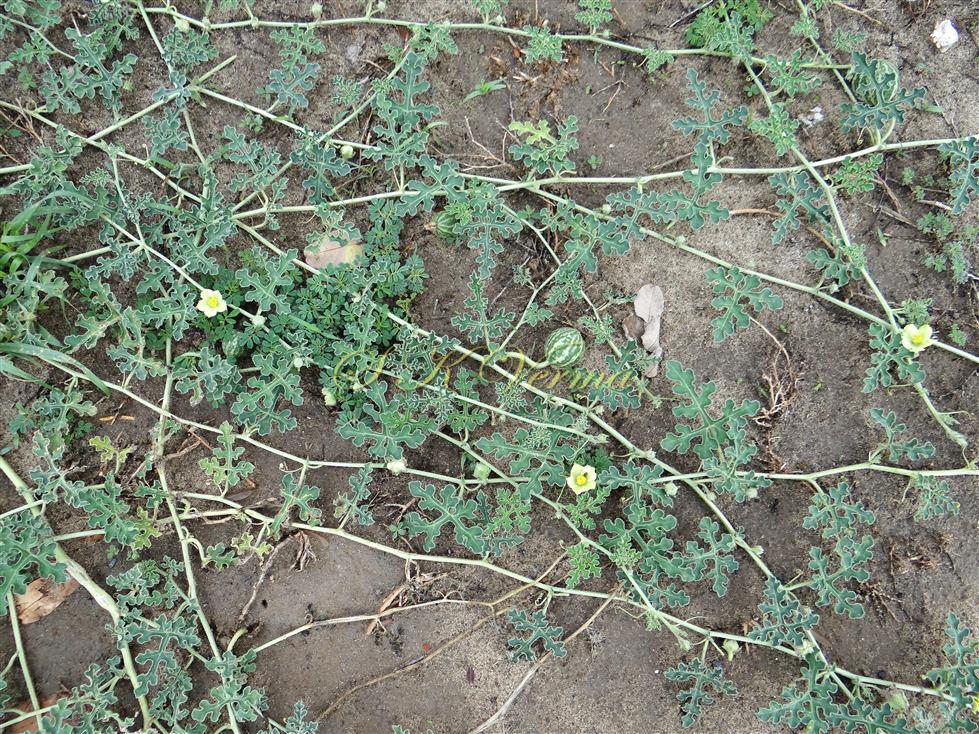
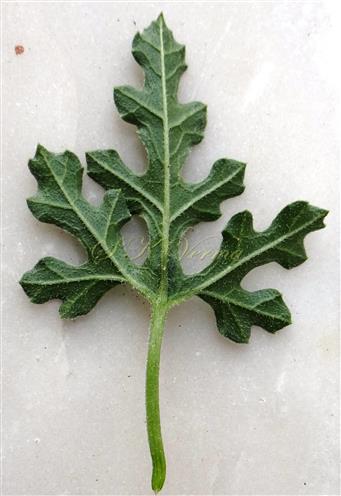
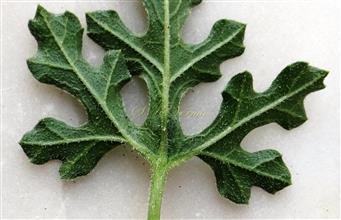
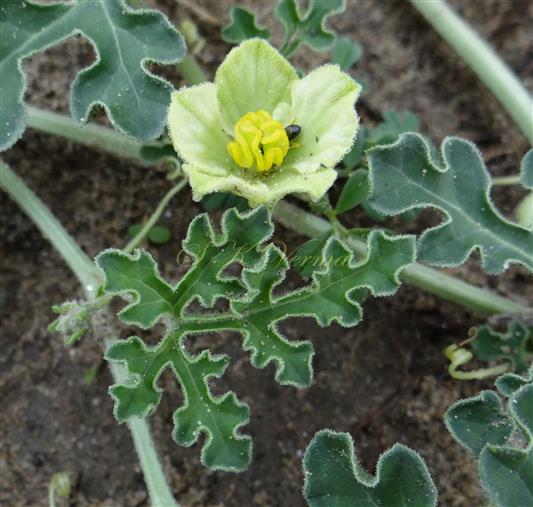
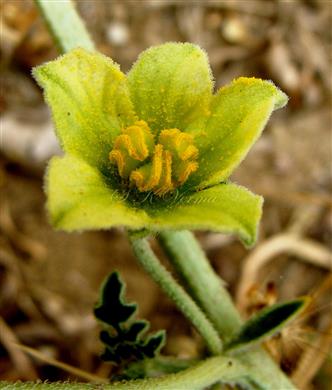
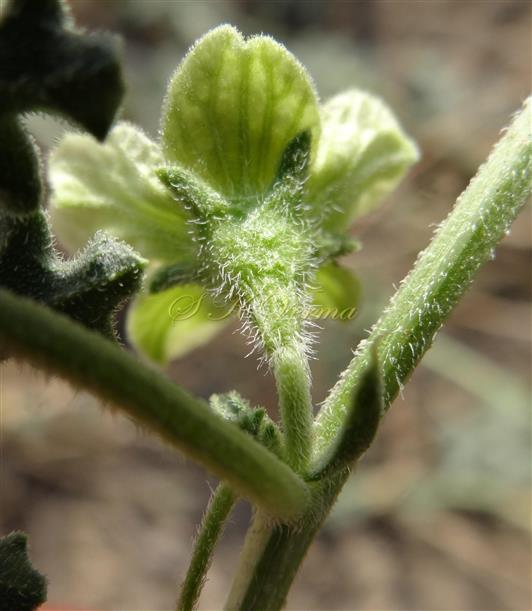
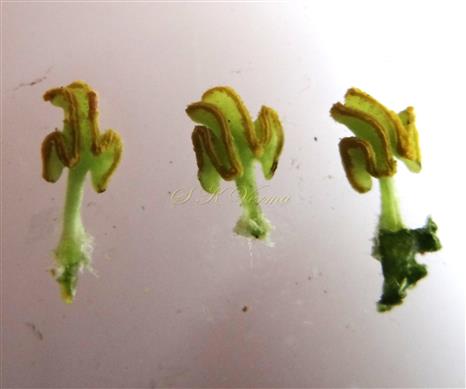
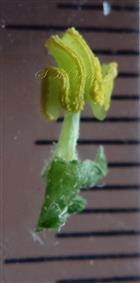
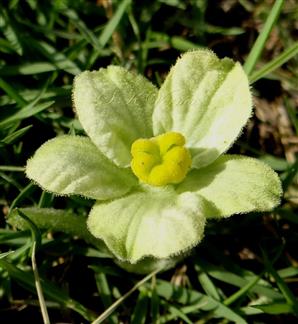
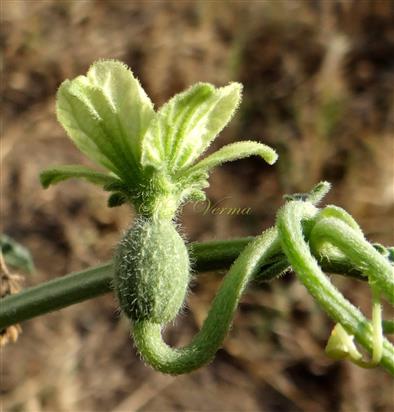
-DSC05424.jpg)
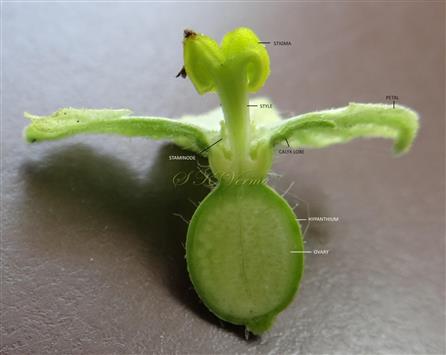
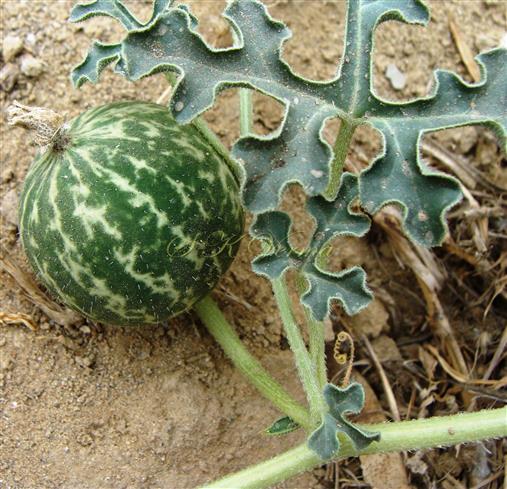











-DSC05424.jpg)

